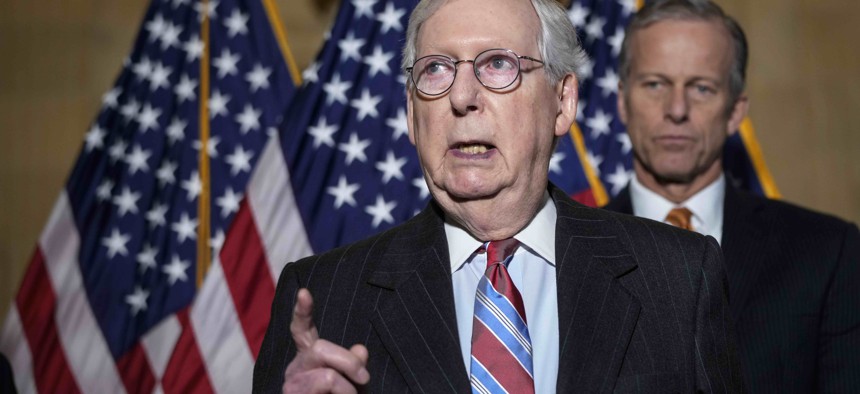McConnell Tells Governors They Can Ignore Biden Highway Priorities

Senate Minority Leader Mitch McConnell (R-KY) speaks to reporters following a lunch meeting with Senate Republicans on Capitol Hill on February 8, 2022. Drew Angerer/Getty Images
The Senate minority leader and fellow Republican U.S. Sen. Shelley Moore Capito say Biden’s transportation department is pushing an agenda that is not in the new infrastructure law.
Two top Republicans in the U.S. Senate had some advice for governors about the Biden administration’s ideas for how highway money should be spent: Ignore it.
The Federal Highway Administration issued guidance in December encouraging states to use the money they were set to receive under the recently passed infrastructure bill in ways to address long-standing problems with the transportation system.
Stephanie Pollack, FHWA’s deputy administrator, said the federal agency wanted states to improve existing roads rather than building new ones. Pollack also promoted projects that promise to reduce carbon emissions, expand transit, add bike lanes and incorporate stakeholders like local governments.
The Infrastructure Investment and Jobs Act signed by Biden in November, Pollack wrote, presented the FHWA with a “unique opportunity” to revisit its relationships with state transportation departments.
Senate Majority Leader Mitch McConnell and U.S. Sen. Shelley Moore Capito of West Virginia, who helped negotiate the bipartisan infrastructure deal, bristled at Pollack’s suggestions. They said they were “disappointed” by the agency’s “wish list” of policies that, they said, were not in the law.
“Congress never envisioned the [infrastructure law] to be a ‘unique opportunity’ for FHWA to ‘evolve the century-old relationship with state departments of transportation’ as the FHWA memorandum suggests,” the Republican senators wrote.
“Nothing in the [infrastructure law] provides FHWA with the authority to dictate how states should use their federal formula funding, nor prioritizes public transit or bike paths over new roads and bridges,” they added. “The FHWA memorandum is an internal document, has no effect of law, and states should treat it as such.”
The missive is the latest in a wave of criticism, especially among Republicans, about the Biden administration’s attempts to steer money that, by law, goes to state governments with very few strings attached. State transportation departments pushed back against the administration’s “one-size-fits-all” approach last month. Sixteen GOP governors, meanwhile, warned the FHWA not to “push a social agenda through hard infrastructure investments.”
While the FHWA has limited power over state decisions, it can make some choices easier than others. Pollack suggested, for example, that projects to add bike lanes could avoid lengthy environmental reviews, while projects that add motor vehicle lanes could get more scrutiny.
The Biden administration’s attempts to sway states over their use of “formula” funds that they automatically get is unusual, but presidential administrations frequently show preferences about the kind of infrastructure improvements they want to see.
Usually, presidential administrations make those preferences known through discretionary grant programs that states and other government entities can apply for.
Former President Donald Trump’s administration explicitly sent more grant dollars to rural communities.
In fact, Elaine Chao, Trump’s transportation secretary and the wife of McConnell, was criticized by the Government Accountability Office for helping to send money to Kentucky, McConnell’s home state. In 2020, Kentucky was the only state to get three grants from the U.S. Department of Transportation’s BUILD grant program.
Daniel C. Vock is a senior reporter for Route Fifty based in Washington, D.C.
NEXT STORY: Millions of Electric Vehicle Chargers Are Coming and Cities Want a Say in Where They Go






